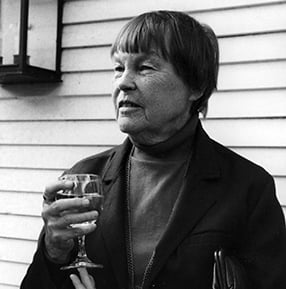Double Exposure
Taking a photo of you taking a photo of me, I see
the black snout of the camera framed by hair, where
your face should be. I see your arms and one hand
on the shutter button, the hedge behind you and
beyond, below, overexposed water and sky wiped white.
Some flecks out of focus are supposed to be boats.
Your back toward what light is left, you’re not
recognizable except by those cutoff jeans that I
gave you by shooting from above, forgetting your
legs. So, if I didn’t know, I wouldn’t know who
you are, you know. I do know who, but you, you know,
could be anybody. My mistake. It was because I
wanted to trip the shutter at the exact moment you
did. I did when you did, and you did when I did.
I can’t wait to see yours of me. It’s got to be
even more awful. A face, facing the light, pulled up
into a squint behind the lens, which must reflect
the muggy setting sun. Some sort of fright mask
or Mardi Gras monster, a big glass Cyclopean eye
superimposed on a flattened nose, that print,
the one you took of me as I took one of you. Who,
or what, will it be—will I be, I wonder? Can’t wait.
© May Swenson. From May Swenson: Collected Poems (Library of America, 2013). Used with permission of The Literary Estate of May Swenson. All rights reserved.
"'Double Exposure' was a kind of love poem I’d always wanted––earthy and witty, with a streak of primal strangeness. May Swenson disliked the label lesbian poetry(and told me so, in a letter). While my generation’s identity politics found expression in publishing collectives and coming-out anthologies, Swenson continued hiding in plain sight. With marriage equality decades away, she knew who she was and whom she loved, inventing playful shapes that explored (among other things) intimacy between women.
"Two women ('you' and 'me') photograph each other in a spirit of experimentation that’s both childlike and scientific. The poem reminds us that we’re animals––'the black snout of the camera framed by hair'––and teasingly suggests simultaneous orgasm: 'I / wanted to trip the shutter at the exact moment you / did.' But the poem’s erotic life is as much about the intimacy of minds in dialogue with one another as it is about bodies. The Cyclops Swenson sees in the single glass eye of the camera lens invites fear into the ritual, but danger is part of the thrill. Glee is the state of mind and feeling as we transform each other: 'Who, / or what, will it be––will I be, I wonder? Can’t wait.'"
—Joan Larkin

